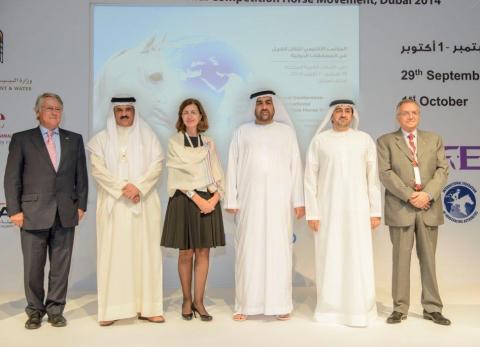
Dubai, October 1, 2014: The Regional Conference for the Middle East and North Africa of the World Organisation for Animal Health (OIE), officially opened by H.E. Minister of Environment and Water of the United Arab Emirates, has brought together a diverse and expert group of public and private representatives interested in the health and welfare of the horse. The objective was to discuss and identify possibilities to harmonise the existing regulations regarding the movements of International Competition Horses in order to facilitate their temporary exportations and importations, in line with OIE standards and the new concept “High Health, High Performance (HHP)” for horses.
This Conference would not have been possible without the extremely valued commitment of the Ministry of Environment and Water of the United Arab Emirates (UAE) and the Emirates Racing Authority (ERA). Several sponsors also brought a significant support, namely the Fédération Équestre Internationale (FEI), the International Federation of Horse Racing Authorities (IFHA), and the Meydan Corporation of Dubai. The participants have deeply thanked the UAE Authorities for hosting the Conference in the prestigious facilities of the Meydan Hotel in Dubai.
International equestrian events have gained economic and social importance over the past decade, with many thousands of events and races each year globally. This evolution has lead to increased trans-boundary movement of competition horses. These temporary exportations and importations of horses for international competitions can pose a challenge to countries’ regulatory framework for veterinary certification. In order to address these constraints, the OIE, the FEI and the IFHA have formed a public-private partnership to develop the “high health, high performance horse (HHP)” concept. The essential aspect of this concept is the creation of a sub-population of “high health, high performance” horses, with special sanitary characteristics that will allow their safe international temporary movement.
Since 2012, the work of an OIE expert group, which brings together equine disease experts, Government and public representatives for equine disease regulatory matters and OIE experts, has lead to a new chapter in the OIE Terrestrial Animal Health Code, adopted by the 180 OIE national Delegates in May this year (chapter 4.16). Biosecurity guidelines were developed too, for the management of the HHP subpopulation at home stables, during travel and at the venues of international events, and for the establishment of Equine Disease Free Zones “EDFZs” or compartments, at international venues.
To identify the concrete nature of the challenges to the movement of competition horses, and facilitate the implementation of the HHP concept at Regional level, the conference in Dubai has gathered government representatives and veterinary specialists from over 18 OIE Member Countries in the Middle East and North Africa who deal with horse import/export requirements, and representatives of the FEI's National Federations and of National Racing Authorities. A number of observer countries that cooperate with this region on exchanges of horses have also been invited.
The countries in this region that belong to the Gulf Cooperation Council (GCC) have already engaged in the promotion of regional harmonization by agreeing on a temporary multi-movement health certificate, which closely mirrors what the HHP concept tries to achieve at a global level. The Meydan stables are also a flagship facility and the biosecurity protocols applied there are exemplary, and protocols from its facilities have often served as the reference.
However, the review of existing import regulations in the region has clearly revealed their diversity, and has led to proposals for harmonisation of regulations in the region for temporary importation of horses for the purpose of competition. The establishment and follow-up of the HHP horse sub-population within countries has also been discussed. The critical importance of Veterinary Services, and their reliable health certification in accordance with OIE Standards was emphasized. Furthermore, the new concept of the Public-Private-Partnership approach, in which the equine industry bodies of the FEI and IFHA working closely with the Veterinary Services, was endorsed by the participants.
The Conference in Dubai for the Middle East and North Africa region was the 3rd of its kind and follows the Conference held for the Americas in Panama in 2012, and for Asia, the near East and Oceania in Hong Kong in February this year. Following this last meeting, the Asian Games, which are currently ongoing in Incheon, Korea, have allowed to field test some of the HHP principles, particularly the EDFZ and a waiver to quarantine requirements pre-export and post-arrival. This has allowed an increase of the number of participating countries by 100% as compared to the last Asian equestrian Games held in Korea.
Categories
- Log in to post comments
